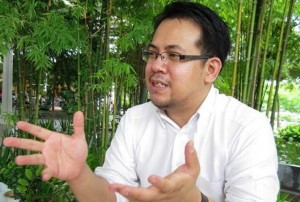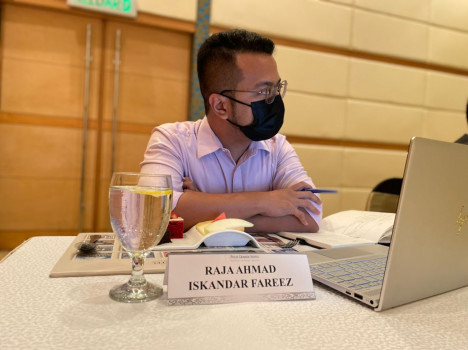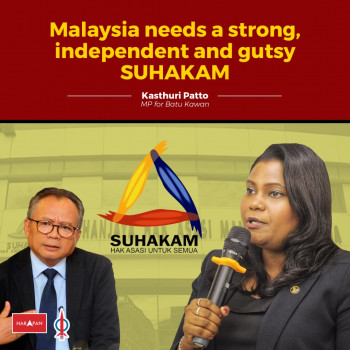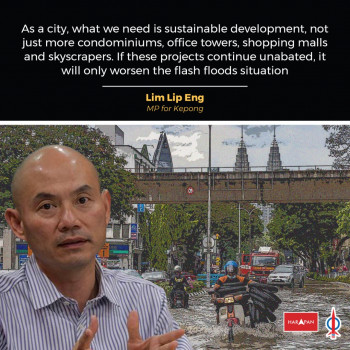 Some candidates, in particular from Barisan Nasional (BN), Malaysia’s ruling coalition for the last half a century, have been going around saying, “We should vote for the party, not the persons”. Their sentiment is understandable. For the first time in 55 years, BN faces the possibility of defeat in a general election. In the last general election five years ago, the opposition pact, Pakatan Rakyat (PR) won most of the popular votes in Peninsula Malaysia. In other words, BN is now at its lowest point in the history of the country. Most candidates from the party are shunned not least due to allegation of corruption and other abuses while in power. Many of them are appealing to the Malaysian voters to give them another five years, some even resorting to the “for old time’s sake” appeal, pointing out that BN had been with the people for 55 years.
Some candidates, in particular from Barisan Nasional (BN), Malaysia’s ruling coalition for the last half a century, have been going around saying, “We should vote for the party, not the persons”. Their sentiment is understandable. For the first time in 55 years, BN faces the possibility of defeat in a general election. In the last general election five years ago, the opposition pact, Pakatan Rakyat (PR) won most of the popular votes in Peninsula Malaysia. In other words, BN is now at its lowest point in the history of the country. Most candidates from the party are shunned not least due to allegation of corruption and other abuses while in power. Many of them are appealing to the Malaysian voters to give them another five years, some even resorting to the “for old time’s sake” appeal, pointing out that BN had been with the people for 55 years.
There are, however, BN candidates who also said that voters should “vote for the persons (candidates), not the party”. This is clearly an attempt to distant themselves from the hugely unpopular ruling coalition. One MCA candidate appealed to voters to remember his service and personal relationship to the people and vote accordingly. He was known for his quick response towards municipal issue such as clogged drains and potholes while he was a state assemblyman.
The question then is, how shall we choose in the 13th General Election (GE13), touted the most historic election since our Independence. As we have seen above, even candidates from the same party have different ideas on how to vote: to vote for the party or to vote for the person?
GE13: Not a contest of names, but ideologies
Setting forth only the options of “Party versus Person” for the voters is a false dilemma.
GE13 should be a game-changer for the country. When we say Change, I believe we do not merely means a change of guards. Change is not just to make Anwar Ibrahim Prime Minister. And as the saying goes, Change is not merely putting “new wine in old wineskins”. In other words, GE13 is “not a choice between two names for the same reactionary doctrines”. Rather, for there to be any chance for Change, GE13 should be a contestation of ideologies.
For the sake of brevity, I will only attempt to highlight three ideological values we should reject and replace when we consider whom we should vote for in the next general election.
Communalism
Firstly, we must reject Communalism. Malaysians have long lived under the grip of racial politics. Barisan Nasional and its key allies are one-race parties. The alienation of other races within the major parties in BN not only impede national integration but had over the years intensified communalist sentiments. UMNO, the party of the Prime Minister, pride itself as defender of the “Ketuanan Melayu” (Malay supremacy) ideology.
Over the years, due to strong protests from Malaysians of all races, including Muslim Malays whose Quranic teaching rejects asabiyah (tribalism) and exhorts “the universal brotherhood of humankind” (eg. in Surah al-Hujurat 13), Prime Minister Najib Tun Razak tried to tone down UMNO’s fascist ideology. However, his attempt was nullified with the creation of Perkasa, an extreme right-wing non-governmental group which advocates “Ketuanan Melayu”. Perkasa is now exposed as an attempt of “astroturfing” by UMNO – the outsourcing of its racist act. Recently, former Prime Minister and UMNO President, Dr. Mahathir Mohammad, who is a respected figurehead in Perkasa categorically said that Malaysia needs more “Ibrahim Ali”, the firebrand leader of Perkasa. Ibrahim Ali has been inciting racial hatred, including calling for the Malay-language bibles to be burned.
Corruption
Secondly, we must reject Corruption. In other countries, the act of corruption is a glitch in the system, a bug, a virus. But in Malaysia, corruption is almost an ideology, deeply entrenched in the culture of the ruling party. Leaders found guilty of “money politics” (an euphemism for “corruption”) by UMNO’s internal investigation are not only let off with a slap on the hand but some are still held in high regards. One most blatant example must be UMNO’s former vice president, Mohammad Isa Abdul Samad. He was found guilty of “money politics” during the 2004 UMNO’s annual national assembly and was suspended from the party for three years. However, within a short period of 6 years, in 2010, Mohammad Isa Abdul Samad made a comeback and was appointed by the government to head FELDA, a government agency for land and agricultural reform. He subsequently led the Felda Global Ventures Holdings (FGVH) IPO exercise, one of the largest plantation companies in the world.
Corruption is not only an epidemic but it is endemic to Malaysia. Corruption is so entrenched that it is doing the civil service, a disservice, so to say. The public delivery system is hampered by abuses both by ruling politicians and the cronies they appointed into high civil offices. From law enforcement to education to health and other public services, corruption not only renders our civil terribly inefficient it also degenerate the image of the civil service resulting in widespread loss of trust. Even the anti-corruption agency, the Malaysian Anti-Corruption Commission is marred with various allegation of malpractices.
Because of corruption, we are also losing our competitive advantage in the increasingly challenging world economy. In a 2012 survey done by Transparency International, 50% of corporate executives in Malaysia asked if they had lost a contract in the past year because of corruption answered “yes”, making Malaysia the worst-ranked in the world. We are now the world champion in corruption! Our neighbour Singapore was rated second cleanest place in the world to do business with Japan topping all other nations as the world’s least-corrupt country to do business.
Crony Capitalism
Thirdly, we must reject Crony Capitalism. By BN’s own admission, Malaysia is stucked in an almost two decade-long middle income trap. The private sector is lackadaisical as private investment has fallen drastically from over 30% of the GDP in the 90s to less than 10% by 2007. With all the buzz over Najib’s Transformation programme through Pemandu, Teraju, ETP, EPP, GTP and what-not, one would imagine Malaysia and Malaysians doing better now. But according to a recent report by REFSA, a local think tank, only 21% of the gross national income (GNI) generated via the ETP trickle down to regular Malaysians, the wage earners. In other words, even if there is wealth, it does not reach the people.
The lack of transparency in the award of government projects resulted in the well-linked few accumulating the choices fat of our country’s wealth. Family members and close associates of Ministers and leaders of the ruling coalition received major contracts many even done up without due process. The acrobatic attempt to explain the dubious grant of an RM250 million government loan to federal Minister Shahrizat Abdul Jalil’s family-linked company National Feedlot Corporation (NFC) is still fresh in the minds of many Malaysians.
Affirmative action policy does not benefit the poor Bumiputera it was supposed to help. Today, 40% of Malaysian household earns below RM 1500 and 77% of these are Malays and Bumiputeras (Orang Asal, and natives from Sabah and Sarawak). It is evident that all the money meant to help the Bumiputeras are not going to the deserving ones.
Masking ideologies
In this coming election, we must reject the party which seeks to prolong and extend the lives of these ideologies. BN’s manifesto promised a lot of handouts and large scale investments, but without the ensuing institutional reforms necessary to weed out the ugliness of communalism, the rotting stench of corruption and the poisonous greed of crony capitalism. In fact, by their actions, UMNO and Barisan Nasional have consistently shown that it is in their interest to ensure the perpetuation of these ideologies. Today, because of its complete failure to reform, BN has resorted to masquerading; as Perkasa, or 1Malaysia or even the latest hype, #BetterNation. But will we vote for Communalism, Corruption and Crony Capitalism?
Pakatan Rakyat on the other hand has offered a change of game plan. Both in its manifesto as well as in the performance of the PR states the last five years, the coalition has shown that it is willing to uphold justice for all Malaysians, promote Competency, Accountability and Transparency as well as to ensure a more equitable economy for all Malaysians (merakyatkan ekonomi). Our vote for PR is not merely to make them Prime Ministers or Ministers or MPs, but we are voting for these values to stop the rot in our country and build a better future for all.
Steven Sim is a councillor of the Seberang Perai Municipal Council (MPSP) and the National Political Education director of DAPSY. He is the DAP candidate for Bukit Mertajam P45 parliamentary seat.




Steven that is an excellent piece of article that you have written. I enjoy it. Keep up the good work. With many of you young brilliant people entering politic there is hope for the nation of Malaysia. God bless.